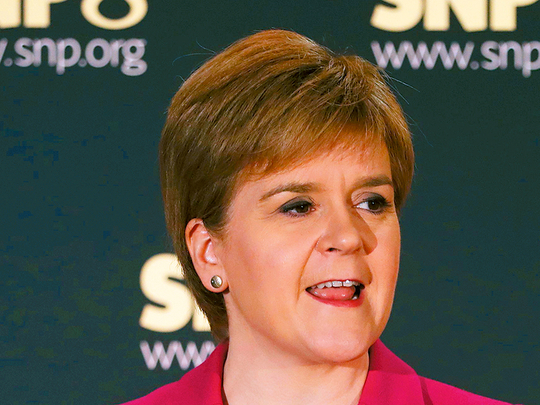
Nicola Sturgeon has spoken for the first time about having had a miscarriage at the age of 40. Scotland’s first minister has been the subject of relentless questioning and speculation throughout her career about not having children.
Sturgeon, 46, told author Mandy Rhodes that the loss of a child was not something she wanted to be defined by but that she was now prepared to discuss the circumstances because she did not want young girls who consider her a role model to conclude that she had deliberately sacrificed parenthood for success as a politician.
Interviewed by Rhodes for the book Scottish Leaders, serialised in the Sunday Times, Sturgeon said she hoped she would still have gone on to be first minister if she had had children. “If the miscarriage hadn’t happened, would I be sitting here as first minister right now? It’s an unanswerable question. I just don’t know. I’ve thought about it, but I don’t know the answer. I’d like to think yes, because I could have shown that having a child wasn’t a barrier to all of this, but in truth I don’t know.
“Having a baby might have so fundamentally changed our lives that things would have taken a different path, but if somebody gave me the choice now to turn back the clock 20 years and say you can choose to start to think about this much earlier and have children, I’d take that. But if the price of that was not doing what I’ve gone on to do, I wouldn’t accept that, no.”
The book describes how Sturgeon, who is married to the Scottish National Party’s (SNP’s) chief executive, Peter Murrell, was in the early stages of pregnancy and preparing to share her news with friends and family when she had a miscarriage.
She continued with a public engagement on January 3, 2011, an event to commemorate the 40th anniversary of the Ibrox disaster, in which 66 Rangers football fans were crushed to death.
Last year, Sturgeon described as crass the cover of the New Statesman magazine which portrayed her and other female politicians who do not have children, including Theresa May and Angela Merkel, standing around a cot with a ballot box inside. After the cover was released, she tweeted: “Jeezo ... we appear to have woken up in 1965 this morning!”
Later, the SNP leader added that while the article contained good analysis, the front cover “reinforces the very prejudices she talks about”.
In the book, Sturgeon also discusses the importance of remaining true to herself, while balancing the demands of her position. “If I ever get to a point in this job where I am scared to show human emotion, I think I will give it up, because that’s the point where you are absolutely not being yourself and it is critically important to me that I remain ‘me’,” she says.
Referring to the Glasgow bin lorry crash and the news that the Scottish nurse Pauline Cafferkey had contracted Ebola while working in Sierra Leone, both of which she had to manage within weeks of becoming first minister in November 2014, she said: “Now, as a politician you have to, on many occasions, keep your human emotions under check in a way that is about representing the nation, particularly in times of tragedy, but politicians are human beings and we share the same reactions to these things as anybody else does.
“I think we should be forgiven for showing how we feel.”












